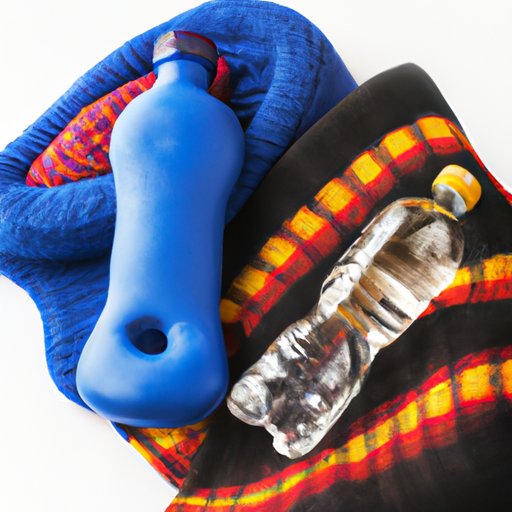Introduction
Hypothermia is a medical condition characterized by an abnormally low body temperature. According to the Centers for Disease Control and Prevention (CDC), the normal body temperature is 98.6°F (37°C). Hypothermia occurs when the body temperature drops below 95°F (35°C). It can lead to serious health complications, such as organ failure, and even death.
Many people struggle to keep their body temperature up during cold weather. To prevent hypothermia, it’s important to know how to not be cold. Here are some tips that will help you stay warm and comfortable in the cold winter months.
Wear Warm Clothes
One of the most effective ways to stay warm is to wear layers of warm clothing. Wearing multiple layers traps air between them, providing insulation and keeping your body warm. Clothing made of wool, cashmere, and other natural materials are ideal for staying warm. Avoid cotton, which absorbs moisture and can make you feel colder.
“Layering is key when it comes to staying warm,” says Dr. Richard Honaker, M.D. “Start with a thin base layer of synthetic material and then add a thicker middle layer, like fleece, and a waterproof outer layer. This will help keep you warm and dry.”
Stay Hydrated
Staying hydrated is important for regulating body temperature. When your body is dehydrated, it has difficulty maintaining a balanced temperature, making you more susceptible to feeling cold. Make sure to drink plenty of fluids throughout the day, especially when you’re outdoors in cold weather.
According to the American College of Sports Medicine, the recommended daily fluid intake for men is 13 cups (3 liters) and for women is 9 cups (2.2 liters). If you’re spending time outdoors in cold weather, you may need to increase your fluid intake to avoid dehydration.
Exercise
Exercising helps generate heat in your body, which can help keep you warm. Cardio exercises, such as running, jogging, and cycling, are ideal for generating heat. Strength training exercises, such as weightlifting, can also help keep your body warm. Aim to get at least 30 minutes of exercise each day.
“Regular physical activity is one of the best ways to stay warm in cold weather,” says Dr. Michael Roizen, M.D. “It not only helps generate heat, but it also increases circulation, which helps keep your body temperature regulated.”
Eat Spicy Food
Spicy foods contain capsaicin, a compound that activates certain receptors in the skin and triggers a warming sensation. Eating spicy food can help raise your body temperature and make you feel warmer. Popular spicy foods include chili peppers, jalapenos, and cayenne pepper.
“Spicy food is a great way to naturally increase your body temperature and stay warm in cold weather,” says Dr. Mark Hyman, M.D. “Just make sure to drink plenty of water to counteract the effects of the spice.”
Use a Hot Water Bottle
Using a hot water bottle can provide additional warmth when you’re feeling cold. Fill a hot water bottle with hot water and place it in areas where you feel cold, such as your feet and hands. The hot water bottle will release heat over time, helping to keep your body temperature up.
“Hot water bottles can be a great way to provide extra warmth on cold winter days,” says Dr. Shilpi Agarwal, M.D. “Make sure to wrap the hot water bottle in a towel or cloth to prevent burns.”
Limit Alcohol Consumption
Drinking alcohol can make you feel warmer initially, but it can actually make you colder in the long run. Alcohol dilates blood vessels in the skin, causing you to lose body heat faster. It can also dehydrate your body, making it harder for your body to regulate its temperature.
“Alcohol can make you feel warm at first, but it can actually cause your body temperature to drop,” says Dr. Roshini Raj, M.D. “It’s best to limit your alcohol consumption in cold weather to avoid getting too cold.”
Find a Heat Source
Finding a heat source can help you stay warm when it’s cold outside. A fireplace, oven, space heater, or electric blanket can all provide warmth. Make sure to keep any heat sources away from flammable materials and follow all safety instructions.
“If you’re feeling cold, try to find a heat source to help warm you up,” says Dr. Sumita Khatri, M.D. “Just make sure to keep the heat source at a safe distance to prevent any accidents.”
Conclusion
Staying warm in cold weather is important for preventing hypothermia. To stay warm, it’s important to wear warm clothes, stay hydrated, exercise, eat spicy food, use a hot water bottle, limit alcohol consumption, and find a heat source. Following these tips will help keep you warm and comfortable in the cold winter months.
(Note: Is this article not meeting your expectations? Do you have knowledge or insights to share? Unlock new opportunities and expand your reach by joining our authors team. Click Registration to join us and share your expertise with our readers.)
